M3U2PROJECT
M3课文背诵句子翻译
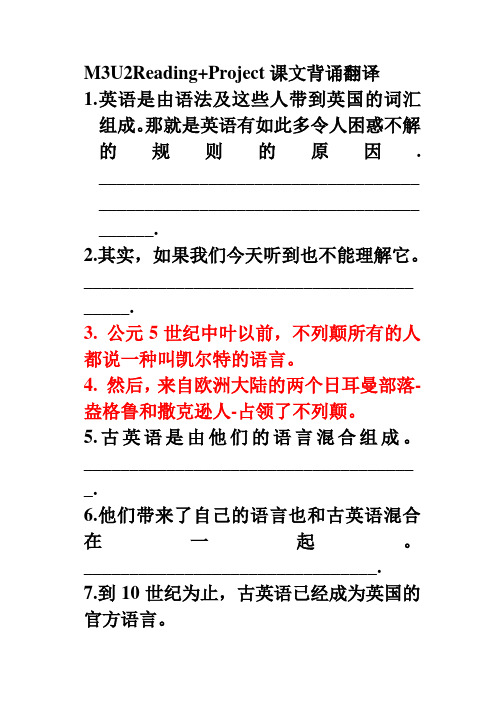
M3U2Reading+Project课文背诵翻译1.英语是由语法及这些人带到英国的词汇组成。
那就是英语有如此多令人困惑不解的规则的原因. ___________________________________ ___________________________________ ______.2.其实,如果我们今天听到也不能理解它。
____________________________________ _____.3. 公元5世纪中叶以前,不列颠所有的人都说一种叫凯尔特的语言。
4. 然后,来自欧洲大陆的两个日耳曼部落-盎格鲁和撒克逊人-占领了不列颠。
5.古英语是由他们的语言混合组成。
____________________________________ _.6.他们带来了自己的语言也和古英语混合在一起。
________________________________.7.到10世纪为止,古英语已经成为英国的官方语言。
8. 当我们今天讲英语时,我们有时对要用哪些词或者短语感到困惑。
9.这是因为英语有许多来自不同语言的单词和短语,但是又有相似的意思。
中古英语:1. 在这一新型英语的发展中,许多东西起了作用。
2. 最大的贡献来自于讲法语的诺曼人,他们于1066年击败英格兰并控制了这个国家。
3.然而诺曼征服对英语的影响并不及约600年前盎格鲁人和萨克逊人的胜利对英语产生的影响那场胜利导致古英语替代了凯尔特语。
____________________________________.4.尽管诺曼人在统治英格兰的整整250年间一直讲法语,但是法语并没有取代英语成为第一语言。
____________________________________________>5. 诺曼征服之后,上层社会的人讲法语,而普通人则讲英语。
6. 但另一方面,英语也确实借用了许多法语单词,因此产生了更多意思相近的单词7. 诺曼人征服英格兰之后,许多英国人以仆人的身份从事饲养动物的工作。
M3U2教学设计

Module 3 Unit 2 I don’t like riding bikes.荣成第三十六中学区石岛中心完小冷文凤Ⅰ. Teaching aims and demands:1.语言知识目标能听、说、认、读单词swimming,skipping,riding bikes;能读出、读懂课文的句子。
2.语言技能目标能用I like…和I don’t like…来表达自己喜欢和不喜欢的体育运动。
3.情感态度目标:通过有趣的课堂活动,激发学生的兴趣,鼓励学生大胆开口说英语,并通过小组活动,培养学生的合作能力。
Ⅱ. Teaching contents:1.教学重点:单词swimming,skipping,riding bikes的认读;并能熟读课文的句子。
2.教学难点:能根据个人的爱好,运用I like…和I don’t like…来表达自己喜好。
Ⅲ. Teaching aids:课件、单词卡片、头饰Ⅳ. Learning steps:一、Warm up.1. Free talk: What’s your favourite…? I like…2. Sing a song.3. Greeting.【目的:通过歌曲、师生间的亲切问候,建立轻松、和谐、民主的课堂气氛,使学生很自然地进入课堂。
】二、Lead-in.T:(出示课件)Welcome to Sports Club1. Look and guess. “What is it?”2. Do and sayT: I like basketball. I like table tennis. What about you? let’s play sports and say.Basketball, basketball, I like basketball;Table tennis, table tennis, I like table tennis;Football, football, I don’t like football.【目的:通过创设参观俱乐部的情景,复习上节课所学的basketball, football, table tennis,morning exercise。
Unit2Greatminds

M3U2 Project (习题训练)一、课堂反馈根据所给首字母或汉语写出单词1 She_________(代表)her fellow workers at the union meeting.2 How many new Chinese c_________ have you learned in this passage?3 We should learn to _________ (结合) our business with pleasure.4 In the old _________(传说)of ancient Troy (特洛伊), the Greeks got into the city by hiding in a wooden horse.5 Humans d_________ from other mammals(哺乳动物)in their ability to speak.6 Try to _________ (简明) your explanation for the children.7 This rule does not only apply to seniors, but to the school as a w_________.8 _______ (起初), we had planned a tour of Shangdong but we never got further than Mount Tai.9 He worker so hard that _________ (终于) he made himself ill10 UFO means unidentified flying o_________.11 There is a _________ (复杂) network of roads round the city.12 In 2001 she retired from politics and took up _________ (写作) as a career.13 Mount Qomolangma is the world’s highest p_________.14 There have been great computer _________ (发展) during the last decade.15 In less than ten years it d_________ from a seed into a full-grown tree.二、巩固练习(一)完形填空As my train was delayed for two hours, I had plenty of time to spare. After buying some magazines to read on the journey, I gave my wife a long-distance call, then I 1 my way to the luggage office to collect my heavy suitcase. I had 2 it there three days before. There were only a few people 3 , and I took out my wallet to find the receipt(收条) for my case.The receipt seemed not where I had 4 it. No matter how hard I searched, the receipt was nowhere to be found.When my 5 came. I explained the situation sorrowfully 6 the assistant. The man looked at me up and down as if to say that he had 7 this kind of story many times and asked me to tell him 8 my case was like. I told him it was an old brown-looking object no different 9 the many cases I could see in his office. The assistant then told me to 10 a list of what was 11 in the case. If they were 12 , he said, I could 13 the case away. I tried to remember all the things I had hurriedly 14 into the case and 15 them down as they came to me.After I had done this, I went to 16 round the office. There were hundreds of 17 there. For one 18 moment, it came to my mind that if someone had picked the receipt he could have easily taken the case already. This had not happened fortunately, for I found the case 19 in the corner. After 20 the things inside, the assistant was satisfied that it was mine, and told me I could take the case away.1. A. traveled B. gave C. had D. made2. A. held B. left C. found D. forgotten3. A. standing B. crowding C. waiting D. talking4. A. placed B. found C. held D. left5. A. turn B. chance C. way D. cause6. A. to B. for C. at D. on7. A. heard B. knew C. realized D. seen8. A. how B. what C. that D. all9. A. from B. with C. to D. among10. A. take B. make C. hold D. put11. A. wholly B. all C. already D. mainly12. A. everything B. wrong C. correct D. all13. A. take B. hold C. bring D. put14. A. place B. put C. held D. kept15. A. took B. gave C. wrote D. had16. A. go B. walk C. run D. look17. A. people B. workers C. cases D. assistants18. A. fearful B. interesting C. sad D. happy19. A, putting B. setting C. placing D. lying20. A. seeing B. examining C. counting D. telling(二)阅读理解AAdvancing technology may have brought many advantages to human beings, yet at the same time it has created another problem —pollution.As factories continuously pour smoke into the sky, chimneys let off smoke, motor-engines send out fumes and chemical processes pollute the atmosphere with bad smells, we are endangering our sense of smell. Although the government protests that pollution of this kind can become less serious by “clean air” campaigns, the pollution problem still exists.Sound pollution caused by the thundering noise of jest which scream overhead and the heavy traffic which grinds along the roads making a continuous attack on our ears can make us deaf or harm our hearing.Polluted water changes the balance of nature and kills life living in it. When strolling by a country stream or on a beach, we notice that the streams are no longer alive and sparkling, for their bad smelling waters are made dirty with petrol, cans, broken bottles and rotten vegetables. Fish are few because few can survive in these waters and we no longer have the chance of watching fish swimming in the water as they catch their food,a victim of progress and pollution.1. Air pollution is caused by ______.A. factoriesB. motor- enginesC. chemical processesD. All of the above2. Sound pollution can make us deaf, because ______.A. we all take jets on our journeyB. there are too many cars, buses and trucks along the roadsC. it makes a lasting attack on our earsD. our hearing is a little harmed3. A country stream may be polluted because ______.A. the balance of nature has been changedB. the water is no longer alive and sparklingC. it is made dirty by petrol, cars, broken bottles and rotten vegetablesD. fish can't swim in the water4. “w e are endangering our sense of smell” means ______.A. our sense of smell is being lostB. something is wrong with our nosesC. we can't smell with our noses any moreD. smell is dangerous to some of us5. Which of the following statements is not true?A. The air pollution problem still exists although the "clean air" campaigns are carried out.B. Advanced technology has brought us both advantages and pollution.C. Fish swimming in the polluted water can kill the plants and animals living there.D. When we are strolling by a country Stream or on a beach, we can smell something bad from the water.BWhen Americans consider families, many of them think of a 'traditional family.' A traditional family is one in which both parents are living together with their children. The father goes out and works and the mother stays home and rears the children. The biggest change in families in the United States is that most families today do not fit this image.The most common type of family now is one in which both parents work outside the home. In 1950, only 20 percent of all American families had both parents working outside the home. Today, it is 60 percent. Even women with young children are going back to work. About 51 percent of women with children younger than one year old now work outside the home.Another big change is the increase in the number of families that are headed by only one person, usually the mother. Between 1970 and 1988, the number of single-parent families more than doubled.Some families look even less like the typical traditional family. They may consist of a couple of one race who have adopted children of another race, or from another country. In many states, single people may also adopt children.Another change is that families in the United States are getting smaller. In the mid1700s, there were six people in the average household. Today the average household contains between two and three people.One recent change is that the number of marriages is rising. The number of babies born also has been climbing steadily for the past 10 years. Many experts see these trends as a sign that Americans are returning to the values of marriage and family.6. From the passage, we can conclude that the biggest change in American families is that _____.A. people' s concept of ' traditional family' changesB. women are more financially independent than they used to beC. the size of a family becomes smaller and smallerD. more and more parents do not live together with their children.7. Which of the following statements is true according to the passage?A. Most of the American families now have members of different nationalities.B. Most American women will work soon after they give birth to children.C. It is possible in the US that unmarried people may also have children.D. It is quite common that children are brought up by the father in an American family.8. The underlined word 'household' means ______.A. familyB. a place to liveC. homeD. all family members9. It can be inferred from the last part of the passage that ______.A. now the American birth rate is risingB. American families are getting biggerC. Americans will return to their traditional familyD. now Americans appreciate their traditional family10. Which of the following would be the best title for the passage?A. The American Family PatternB. The Typical Traditional FamilyC. The Changing American FamilyD. The American Concept of Family。
牛津高中英语模块3ReadingProject课文
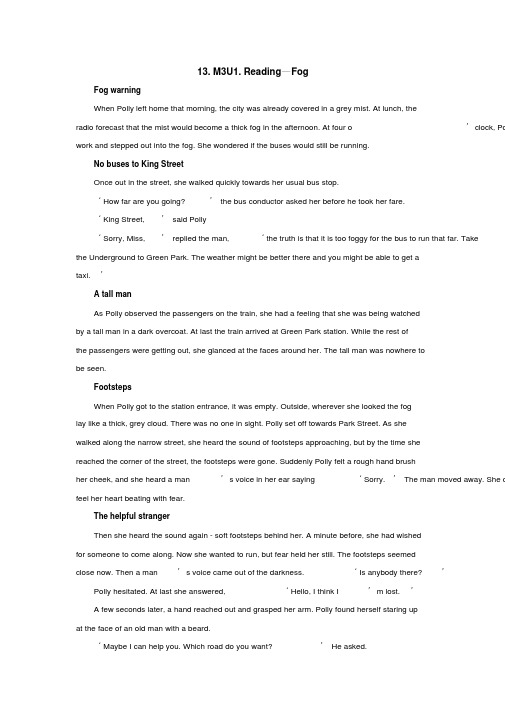
13. M3U1. Reading—FogFog warningWhen Polly left home that morning, the city was already covered in a grey mist. At lunch, theradio forecast that the mist would become a thick fog in the afternoon. At four o’clock, Po work and stepped out into the fog. She wondered if the buses would still be running.No buses to King StreetOnce out in the street, she walked quickly towards her usual bus stop.‘How far are you going?’ the bus conductor asked her before he took her fare.‘King Street,’ said Polly.‘Sorry, Miss,’ replied the man, ‘the truth is that it is too foggy for the bus to run that far. Takethe Underground to Green Park. The weather might be better there and you might be able to get ataxi.’A tall manAs Polly observed the passengers on the train, she had a feeling that she was being watchedby a tall man in a dark overcoat. At last the train arrived at Green Park station. While the rest ofthe passengers were getting out, she glanced at the faces around her. The tall man was nowhere tobe seen.FootstepsWhen Polly got to the station entrance, it was empty. Outside, wherever she looked the foglay like a thick, grey cloud. There was no one in sight. Polly set off towards Park Street. As shewalked along the narrow street, she heard the sound of footsteps approaching, but by the time shereached the corner of the street, the footsteps were gone. Suddenly Polly felt a rough hand brushher cheek, and she heard a man’s voice in her ear saying ‘Sorry.’ The man moved away. She c feel her heart beating with fear.The helpful strangerThen she heard the sound again - soft footsteps behind her. A minute before, she had wishedfor someone to come along. Now she wanted to run, but fear held her still. The footsteps seemedclose now. Then a man’s voice came out of the darkness. ‘Is anybody there?’Polly hesitated. At last she answered, ‘Hello, I think I’m lost.’A few seconds later, a hand reached out and grasped her arm. Polly found herself staring upat the face of an old man with a beard.‘Maybe I can help you. Which road do you want?’ He asked.‘I live at 86 King Street,’ Poly replied.‘Just take my hand,’ said the man. ‘Come with me. You’ll be all right.’ He took Polly ‘Watch out for the step here.’In his other hand the man carried a stick. Polly heard it hit the step. ‘I can remember some terrible fogs, but maybe that was before your time. I can’t see your face, but you sound young. How old are you?’‘Just twenty,’ answered Polly.‘Ah, twenty! A nice age to be! I was young once. Now we’re at the crossroads. Turn lefthere.’‘I’m quite lost now. Are you sure you know the way?’ Polly was beginning to feel frightened again.‘Of course. You really shouldn’t feel anxious.’ He held her hand more firmly.The grateful helper‘Here we are. King Street.’ He stopped.‘Thank you so much for coming to my aid,’ said Polly in relief. ‘Would you like to come i and rest for a while?’‘It’s very nice of you,’ said the man, ‘but I’ll be off. There may be more people lost today, and I’d like to help them. You see, a fog this bad is rare. It gives me the chance to pay back thehelp that people give me when it’s sunny. A blind person like me can’t get across the road with help, except in a fog like this.’14. M3U1. Project (1)—Shark attacksThere are nearly 400 different types of sharks, but only about 30 types are known to haveattacked human beings. Many people know that the most dangerous shark is the great white shark,mainly because they have seen the movie Jaws. However, two other sharks are also ratherdangerous: the tiger shark and the bull shark.Contrary to what many people might assume, evidence shows that sharks seldom attackhumans. There are three types of shark attacks. In the main type, the shark attacks you because itmistakes you for a fish, but when it tastes human flesh it decides to give up and swim away. In thesecond type, the shark pushes you with its nose to find out if you are fit to be eaten, and then bitesyou if it thinks you are. In the third type, the shark waits for you to swim by, and then attacks yousuddenly. The last two types of attack more often result in the death of humans.To reduce the risk of a shark attack, you should follow these suggestions.Do not swim in the dark. Sharks can still see you but you cannot see them.Do not go swimming in the ocean if you have a fresh wound. Sharks can smell bloodover a long distance.Do not wear bright clothing or jewellery, because sharks are attracted to the flash ofcolors and bright objects.Stay in groups, as sharks usually avoid large numbers of people.Recently, shark attacks have been increasing as water sports are becoming more popular. If a shark attacks you, follow the advice below.Keep calm. Do not panic.Hit the shark on the nose with your fist.Stick your finger in the shark's eye.Don't be frightened by sharks: you are 30 times more likely to be hit by lightning than be attacked by a shark.15. M3U1. Project (2)—The wonderful world of pigeonsIt is night. All is quiet. The soldiers are asleep while a guard watches for the enemy. There isa flash, and the sound of guns! They are being attacked! Hundreds of enemy soldiers rush towards them. They are all going to be killed unless they get help. What should they do?An officer writes a short message quickly on a small piece of paper: 'Being attacked! Hurry!' He rolls up the paper and puts it into a small case, and then reaches into a cage and gets a bird. Attaching the message to its leg, he sets the bird loose. It immediately flies into the air and disappears in the dark.Will the bird arrive in time? Will they be saved?Though it may seem hard to believe, the bird the officer uses is the same bird often seen in public parks—the pigeon. Pigeons have a wonderful sense of direction and can find their way home over long distances. Indeed, pigeons have been known to fly home from as far away as 1,800 kilometres. That is why pigeons have been used since ancient times to carry the news oreven the mail. However, it was in war that they found their greatest use. During both World War Iand II, pigeons were employed by armies to carry messages to and from the front lines, saving the lives of many soldiers and even helping win some important victories.How do pigeons find their way? Pigeons appear to have a compass inside them that tells themwhich way is north. How this compass works remains a mystery. Of course, since a compass alone is not enough to find one's way, they also appear to use their sight and even their sense of smell to tell them which way they should go. Unlike humans, they never get lost and can always find their way home.16. M3U2. Reading—English and its historyAll through history, people from many different countries and cultures have lived together in Britain. The English language is made up of the grammar and vocabulary these people brought to Britain. That is why English has so many difficult rules that confuse people.Old EnglishOld English is very different from the English we speak nowadays .In fact, we would not be able to understand it if we heard it today. Before the middle of the 5th century, people in Britain all spoke a language called Celtic. Then two Germanic groups from the European mainland—the angles and the Saxons—occupied Britain. Old English consisted of a mixture of their languages. (Both the English language and the English people are named after the angles; the word Angle was spelt Engle in old English.) Aside from place names such as London, very few Celtic words became part of old English. At the end of the 9th century, the Vikings, people from Northern European countries such as Denmark and Norway, began to move to Britain. They brought with them their languages, which also mixed with Old English. By the 10th century, Old English had become the official language of England.When we speak English today, we sometimes feel puzzled about which words or phrases to use. This is because English has many words and phrases from different languages, but with similar meanings. For example, the word sick came from a word once used by the Angles and the Saxons, while ill came from a word once used by the Norwegians.Middle EnglishMiddle English is the name given to the English used from around the 12th to the 15th centuries. Many things played a part in the development of this new type of English. The most important contribution was from the Normans, a French-speaking people who defeated Englandand took control of the country in 1066. However, the Norman Conquest did not affect English as much as the Angles and the Saxons’ victory about 600 years earlier, which led to old English replacing Celtic. Even though the Normans spoke French for the entire 250 years they ruledEnglish, French did not replace English as the first language. On the other hand, the English language did borrow many words from French. This resulted in even more words with similar meanings, such as answer(from Old English) and reply(from Old French). It is interesting to learn how the words for animals and meat developed. After the Norman Conquest, many English people worked as servants who raised animals. Therefore, the words we use for most animals raised for food such as cow, sheep and pig, came from Old English. However, the words for the meat of these animals, which was served to the Normans, came from Old French: beef, mutton, pork and bacon.Old French made other contributions to Middle English as well. In Old English, the Germanic way of making words plural was used. For example, they said housen instead of houses, and shoen instead of shoes. After the Normans took control they began using the French way of making plurals, adding an –s to house and shoe. Only a few words kept their Germanic plural forms, such as man/men and child/children.After the Norman Conquest, high-class people spoke French while common people spoke English. However, by the latter half of the 14th century, English had come into widespread use among all classes in England. In 1399, Henry IV became King of England. His mother tongue was English, and he used English for all official events.Modern EnglishModern English appeared during the Renaissance in the 16th century. Because of this, modern English includes many Latin and Greek words. Pronunciation also went through huge changes during this period. Of course, this was not the end of the changes in the English language. The question of whether English will keep on changing in the future is easy to answer. It is certain that this process will continue, and people will keep inventing new words and new ways of saying things.17. M3U2. Project (1)—The development of Chinese charactersThe Chinese language differs from Western languages in that instead of an alphabet, it uses characters which stand for ideas, objects or deeds. Chinese words are formed by putting together different characters. In many cases, a single character can also make up a word. The history of the Chinese language can be examined by looking at how these characters developed.Chinese writing began thousands of years ago. According to an ancient story, a man named Cang Jie invented Chinese writing. One winter day while he was hunting, he saw the tracks ofanimals in the snow and observed that the appearance of each one was different. Then he had theidea that he could use different shapes to represent different objects. The first Chinese characterswere drawings of physical objects. Some characters have been simplified and others have beenmade more difficult over time. However, as a whole, the characters have developed from drawingsinto standard forms. The character for a mountain was at first three mountaintops together. Thisbecame one mountaintop and three lines, and over time turned into the character used nowadays.Not all characters were developed from drawings of objects. Sometimes to express ideas,some characters were made by combining two or more characters together. For example, ‘rest’ was made up of the characters for a man and a tree. The character ‘prisoner’ was formed wits were developed for directions and numbers. It is easy to‘man’ inside a square. Other characterdistinguish their meanings by looking at them, for example, the characters for ‘up’ and ‘down’which are opposites of each other.Though these kinds of characters indicate meanings, one of their shortcomings is that they donot show how they should be pronounced. Therefore, a method was developed to have one part ofa character indicate the meaning and the other suggest the pronunciation. Many Chinese charactersused today were made this way.In the 1950s the Chinese government introduced simplified Chinese characters and now theyhave widespread use in China’s mainland.18. M3U2. Project (2)—The story of BrailleUsually, when we talk about reading, we think of using our eyes to see letters written in inkon paper. However, this is not always true. For example, blind people cannot see, but they can stillread books.The man who introduced blind people to reading was Louis Braille (1809-1852). Braille losthis eyesight at the age of three as a result of an injury. When he was ten, he went to a school forthe blind in Paris. In those days, books for blind people used paper pressed against metal wire toform letters. Since the metal wire was heavy, each book weighed as much as 100 pounds. Thewhole system was not convenient for use. Indeed, the school library only had fourteen such booksin it.In 1821, a soldier visited the school and showed the students a system for passing messagesat night during times of battle. His system used paper with small, raised dots that could be feltwith the fingers. Each letter of the alphabet was represented by a different pattern which consistedof twelve dots. The soldiers would drag their fingers over the raised dots to read the message.While the students found the so ldier’s idea interesting, the system was too difficult to be ofpractical use. However, young Louis Braille took the idea and worked on it. At the age of fifteen,systemhe created a system with patterns of six raised dots representing each letter. ‘Braille’for reading used today by blind people around the world, was thus born.The blind can easily recognize Braille with the fingers. They can also easily write in Braillewith a special typewriter. Today, it is the most common system used by blind people for readingand writing, and nearly every language, including Chinese, has its own version of Braille for itspeople to use.19. M3U3. Reading—Lost civilizationsDay 1,15 JulyI feel lucky to have won a place on this trip. We are in Italy now, and tomorrow we arevisiting Pompeii. Next week we are flying to China, and going Loulan, which is known as China'sPompeii in the desert. Both Pompeii and Loulan became lost civilizations long ago.Day 2,16 JulyThis morning we attended a lecture about Pompeii. The city was founded in the 8th centuryBC. In 89 BC, the Romans took over Pompeii. It then became a rich and busy city. Near the citywas a volcano. On 24 August AD 79,the volcano erupted and lava, ash and rocks poured out of itonto the surrounding countryside. It continued to erupt for the next two days. Many people wereburied alive, and so was the city. How unfortunate!Day 3,17 JulyToday I saw the ancient Roman city of Pompeii as it was 2,000 years ago. How amazing! Thecity was forgotten for many years until the 18th century when a farmer discovered a stone withwriting on it. People started to dig in the area for treasure, which caused much damage. Thus, in1860,the area was put under government protection so it could be preserved and studied.When I walked around the city, I saw streets just as they had been, with stepping stones alongthe road so you did not have to step in the mud on rainy days! I saw several houses which weredecorated with wall paintings. I also saw the people who had been buried alive. It turns out thatafter the ash covered the people who failed to flee the city, their bodies nearly completely brokedown and disappeared, leaving empty spaces in the ash. Years later, researchers were able to usethese empty spaces to produce true-to-life figures of the people who had died in the disaster. Youcan see them today in Pompeii, in the same places where the people fell. The volcano is still there, but looks very quiet now. It's hard to imagine how this peaceful volcano destroyed the whole city!Day 10,24 JulyFinally, we arrived in Loulan after several days of travelling. This commercial city was busyand wealthy about 2,000 years ago. It was a stopping point on the famous Silk Road between the East and the West. It is believed to have been gradually covered over by sandstorms form AD 200 to AD 400. I am so excited to be here!Day 11,25 JulyA scholar from the local cultural institute, Professor Zhang, told us that around the year 1900 the European explorer Sven Hedin discovered the ruins of the Loulan Kingdom. Sven found the remains of buildings buried beneath the sand, together with a lot of treasures including coins, painted pots, material such as silk, documents and wall paintings. When we went to the city, wesaw the city walls, palaces, temples, workshops and towers. We found the ruins most interesting. There was an ancient water system that ran through the middle of the city. The desert was once a green land with huge trees, but they were cut down and that resulted in the city being buried by sand——what a pity!20. M3U3. Project (1)—Ancient Greek statue found in XinjiangResearchers announced the discovery of a small statue in northern Xinjiang, China, recently. The metal statue is of a Greek soldier. When asked how a statue from distant Greece could have appeared in China, researchers explained that no doubt this was a result of Alexander the Great influence.Alexander the Great (356-323 BC) was the son of a Greek king who defeated many Greek cities in battle. At the age of twenty, Alexander himself became king after his father died. However, many cities rose up against Alexander, so he led an army to take them back. Though his army had only 3,000 troops, he won every battle and many enemy soldiers joined him.In 334 BC, he took his army, now with 42,000 men, into the Middle East and then Egypt, defeating every army that stood in his path. Then he turned his eyes east, and marched all the way to India, finding victory wherever he went. It seemed that nothing could stop him from taking control of the entire world. However, his own army grew tired of endless battles and refused to go any further, so he had to turn back. By the age of thirty, he had already occupied more land thananyone before, and it seemed that more glory was waiting ahead of him. Yet, in 323 BC, he came down with a fever and died. Since he had no son, his generals divided his vast kingdom among themselves.Alexander the Great spread the Greek culture from Europe to Africa and Asia, influencingthe world for centuries to come. The statue of the Greek soldier found in northern Xinjiang probably came to China in the 4th century BC as a result of trade. Like many other ancient objects that show a Greek influence, it can now be seen in a museum in Urumqi.21. M3U3. Project (2)—The father of Western philosophyThe world 'philosophy' means 'love of wisdom'. Philosophy can be thought of as a way of looking at the world around us, or of answering the great questions of life, such as 'Why are we here?' and 'What is truth?'The father of Western Philosophy was Socrates (469-399 BC).Socrates was from Athens, in Greece. When he was young, he was a brave soldier. Later, he became a teacher, but he taught for free and earned his salary from being a common worker. Aside from this, we know very little about him. Since he never wrote a book, we also know very little about his philosophy. Yet, Socrates has had a deep influence on Western thought and science.To understand how this can be true, we must understand how Socrates taught. Socrates taught by asking questions. Through this, he challenged his students to develop and explain their own arguments. In many cases, his questions made his students aware of their own errors. Many students got embarrassed and even angry when this happened, while others changed their opinions. Socrates' way of approaching the truth is now called the Socratic Method. The idea of asking questions until you reach the right answer is the basis of modern philosophy and science.Unfortunately for him, Socrates questioned too much. He always asked challenging questions to everyone he met, upsetting many people in Athens. Finally, some people had had enough of him, so they took him to court for questioning the existence of the Greek gods and for corrupting the young people of Athens. At his trial, he defended himself by asking his judges yet more questions. This just made a bad situation worse. Finally he was put to death by being forced to drink poison. Through his death, Socrates became the hero of all people who search for the truth.。
M3U2 Task(叶文斌)
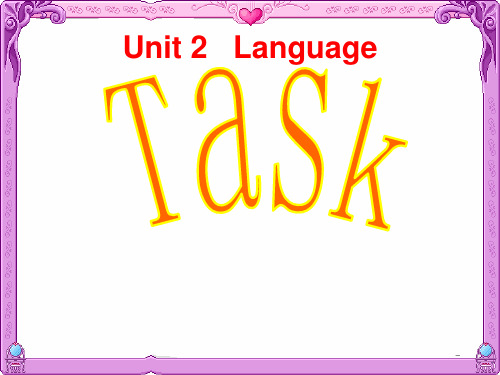
Four main sections to sort information into:
1.Introduction-What the report is about. 2.Method-How you found the information. 3.Results-What you found out or proved in your report. 4.Conclusion-A summary of the report. It sometimes include advice.
Unit 2 Language
Skills building 1
predicting a response
Understand how to predict the answers to the question while listening. Question Where do they live?
In the USA it means ‘Hello’, but in China it means 'N0.', a negative answer. Nowadays, some young Chinese also use this gesture to greet others. So with the increase in cultural, educational and economic exchange between the two countries, the differences in body language between the two nations will become smaller and smaller.
4BM3U2教学说明
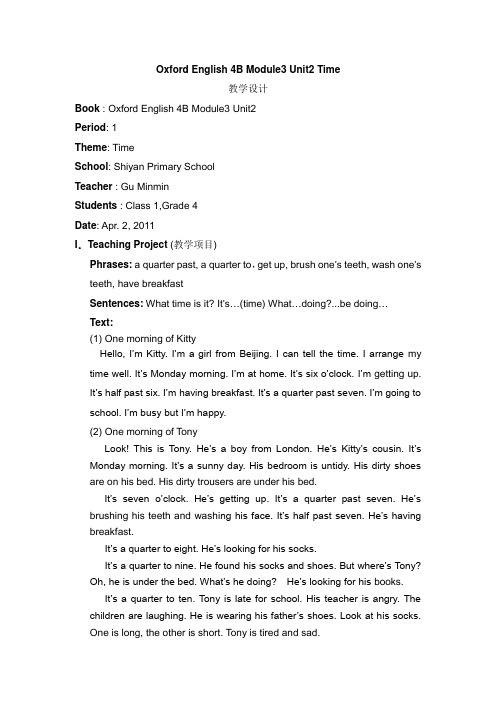
Oxford English 4B Module3 Unit2 Time教学设计Book : Oxford English 4B Module3 Unit2Period: 1Theme: TimeSchool: Shiyan Primary SchoolTeacher : Gu MinminStudents : Class 1,Grade 4Date: Apr. 2, 2011I.Teaching Project (教学项目)Phrases: a quarter past, a quarter to,get up, brush one’s teeth, wash one’s teeth, have breakfastSentences: What time is it? It’s…(time) What…doing?...be doing…Text:(1) One morning of KittyHello, I’m Kitty. I’m a girl from Beijing. I can tell the time. I arrange my time well. It’s Monday morning. I’m at home. It’s six o’clock. I’m getting up.It’s half past six. I’m having breakfast. It’s a quarter past seven. I’m going to school. I’m busy but I’m happy.(2) One morning of T onyLook! This is T ony. He’s a boy from London. He’s Kitty’s cousin. It’s Monday morning. It’s a sunny day. His bedroom is untidy. His dirty shoes are on his bed. His dirty trousers are under his bed.It’s seven o’clock. He’s getting up. It’s a quarter past seven. He’s brushing his teeth and wash ing his face. It’s half past seven. He’s having breakfast.It’s a quarter to eight. He’s looking for his socks.I t’s a quarter to nine. He found his socks and shoes. But where’s T ony?Oh, he is under the bed. What’s he doing? He’s looking for his books.It’s a quarter to ten. T ony is late for school. His teacher is angry. The children are laughing. He is wearing his father’s shoes. Look at his socks.One is long, the other is short. T ony is tired and sad.II. Teaching Aims (教学目标):A. Knowledge Aims (语言知识):1. 掌握a quarter past 与a quarter to的时间表达与区别,理解和运用这两个短语。
九年级英语上m3u2课件
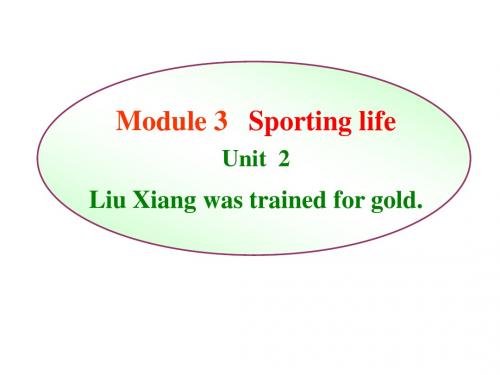
Future plans Wil _____ _____more medals for China.
Read the text ,find the phrases
1、一个体育英雄__________2、一个金牌获得者______________________ 3、体校_________________4、继续赢奖__________________________ 5、首先_________________ 6、世界体坛(育)的成功________________ 7、既然,由于___________ 8、确信,保证_________________________
课堂检测 • • • • • • • • • • • • • • • • • • • • • • • • 1.选择题 ( )1.Please a red flag on the square. A. build B.set up C. put up D. set on ( ) 2. you have go a chance ,you might as well make full use of it . A. Now that B. after C. Although D. As soon as ( ) 3. This is the shop I have bought many things from. A. there B. when C. where D. which ( ) 4.Mr. Green always weekends playing with his children. .A. spends B. takes C. costs ( ) 5. Daniel is the first student and the last one . e; leave B. coming; to leave C. to come; to leave D.to come;leaving 2..改写下列句子(主动句改为被动句,被动句改为主动句) 1)A special programme helped Liu Xiang 2)His skill at hurdling was noticed by his coach Sun Haiping. 3)Coach Wang Bilin noticed Zhang Yining . 4)Wang Bilin asked Zhang Yining to go to Shichahai Sports School 3.写作训练 Name: Zhang Yining Name: Zhang Yining Sex: Female Place of birth: Beijing Birthday: 1981.10.5 Height: 188 cm Body weight: 54 kg Project: table tennis Hobby: swimming be good at : table tennis Achievement:a gold medal,2008 _______________________________________________________________________________ _______________________________________________________________________________________ _______________________________________________________________________________________ _______________________________________________________________________________________ _______________________________________________________________________________________ _______________________________________________________________________________________ _______________________________________
九上M3U2阅读教学-牛玉玲
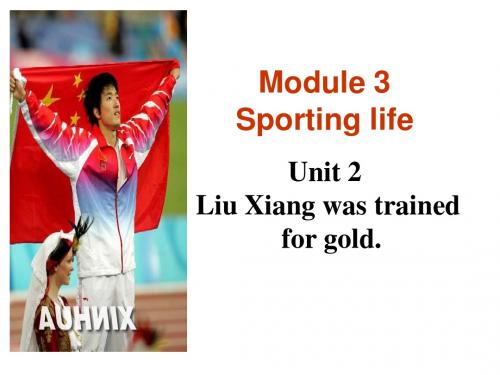
Part1
Para1--- For Liu Xiang, life as a sporting hero….. Para2--- And now that he’s well known…. Para3--- Liu Xiang is not an overnight success. Para4--- Liu Xiang was helped by…..
2001
1998 1993 1983
Rewrite the notes in Activity 3 in full sentences . Liu Xiang was born in Shanghai in 1983.
1.He was born in Shanghai in 1983. 2.In 1993, he started training at a sports school. 3.His hurdling skill was noticed in 1998. 4.His training programme was changed in 2001. 5. In 2002 he won in Switzerland and Korea. 6.In 2004, he won an Olympic gold medal in Athens. 7. In 2007, he won a gold medal in the World Athletics Championships.
Part2
Part3
Para5--- So what’s next for Liu Xiang? Para6 --- No, Liu Xiang will go for more medals…
What does the writer talk about in each part?
高二英语Mainly Revision上课学习上课学习教案
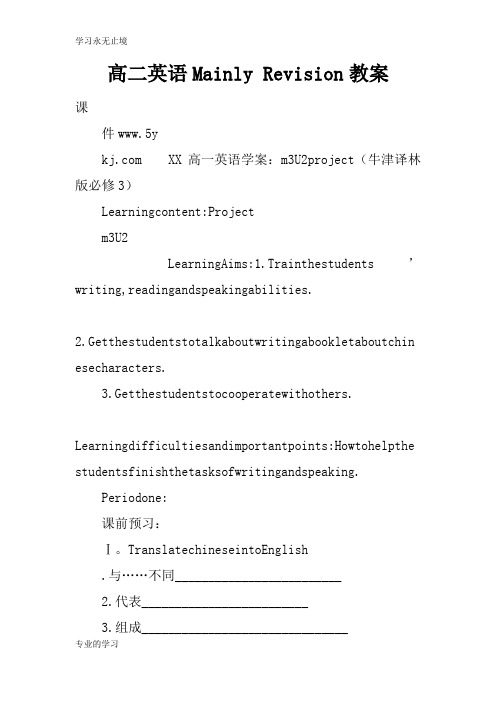
高二英语Mainly Revision教案课件www.5y XX高一英语学案:m3U2project(牛津译林版必修3)Learningcontent:Projectm3U2LearningAims:1.Trainthestudents’writing,readingandspeakingabilities.2.Getthestudentstotalkaboutwritingabookletaboutchin esecharacters.3.Getthestudentstocooperatewithothers.Learningdifficultiesandimportantpoints:Howtohelpthe studentsfinishthetasksofwritingandspeaking.Periodone:课前预习:Ⅰ。
TranslatechineseintoEnglish.与……不同_________________________2.代表_________________________3.组成_______________________________4.根据________________________5.总体来说________________6.由……构成_________________________7.失明____________________8.在战争时期_________________________9.实用用途___________________________0.致力于______________________1.有自己的盲文版本___________________________Ⅱ。
ReadthearticleatP38andanswerquestions..Howoldisthechinesewriting?2.whoinventedchinesecharacters?3.Howwaschinesewritinginvented?4.whendidthechinesegovernmentsimplifiedcharacters?III.Readthepassageagainanddividethepassageintosever alparts,thengivethemainideaofeachpartPara.1.__________________________________________________-Para.2.____________________________________________ _________Para.3-6___________________________________________________ ____Para.7-8___________________________________________ ______________自主学习过程:.Thechineselanguagediffersfromwesternlanguagesi nthat,insteadofanalphabet,itusecharacterswhichstand forideas,objectsordeeds.【句法分析】which引导的定语从句修饰先行词characters.differfrom和……不同,不同于e.g.FrenchdiffersfromEnglishinthisrespect.【拓展】AdiffersfromB=AandBdiffer=AisdifferentfromBA和B不同differin在……方面不同differwithsbabout/on/oversth在某事上与某人意见不同inthat在于,因为,引导原因状语从句e.g.Shewasfortunateinthatshehadfriendstohelpher.standfor代表,容忍,支持,主张e.g.The“Po”standforPostoffice.I’mnotstandingforitanylonger.Ihatedtheorganizationandallitstoodfor.【拓展】standby袖手旁观standdown退出比赛standout显眼standupfor支持,维护standupto勇敢面对,经得起deed行为,行动Abrave/charitable/evildeed2.chinesewordsareformedbyputtingtogetherdifferentcharacter.form形成,构成,组织,养成,培养(v)形状,外形,形式,表格(n)e.g.Ican’tformanyideaoropinionaboutit.oneshouldformagoodhabitofreadingwhenyoung.Pleasefillthisforminink.【拓展】Amatterofform例行公事,礼节问题intheformof以……的形式aftertheformof照……的格式inform表现正常,情况良好taketheformof采取……的形式beoutoftheform处于不良的竞技状态3.onewinterdaywhilehewashunting……hunt打猎,追寻e.g.ahuntingdoggohunting【拓展】beonthehuntfor正在寻找,在寻求……中thehuntforsb/sth寻找某人、某物huntfor/after追逐,寻找,搜索ahunterforfame一个追求名誉的人4.Somecharactershavebeensimplifiedandothershavebeen mademoredifficultovertime.simplify使简明,使简易,简化e.g.trytosimplifyyourexplanationforthechildren.【单词积累】simplification简化simplified简化的overtime久而久之,随着时间的推移,over强调一种动态的时间e.g.thecolourofthecarpetwillnotfadeovertime.5.Sometimestoexpressideas,somecharacterweremadebyco mbiningtwoormorecharacterstogether.combine使结合,使联合combinesthwith/andsth把……和……联合起来e.g.canironcombinewithwaterandoxygentoformrust?6.It’seasytodistinguishtheirmeaningbylookingatthem.…………“up”and“down”,whichareoppositesofeachother.distinguish①区分,分辨,分清distinguishbetween……and……=distinguish…..from…..e.g.Atwhatagearechildrenabletodistinguishbetweenrig htandwrong?②使具有……特色,使有别于……e.g.whatwasitthatdistinguishedherfromherclassmates?③看清,听出,认出e.g.Icouldnotdistinguishherwords,butshesoundedexcit ed.④使出众,使著名distinguishoneselfas作为……而使某人杰出e.g.Shehasalreadydistinguishedherselfasanathlete.【单词积累】distinct有区别的,不同的distinction差别,不同,区分,分辨distinguishable可辨别的distinguished杰出的,著名的,高贵的,有尊严的opposite①对立面,反面e.g.Hotandcoldareopposites②相反的,迥然不同的,对面的,另一边的e.g.Shetriedcalminghimdown,butitseemedtobehavingthe oppositeeffect.Theshopisontheoppositesideofthestreet.③与……相反,在……对面e.g.Thepeoplesittingoppositeuslookedveryfamiliar.【拓展】thecompleteopposite恰恰相反quitetheopposite正好相反oppositeto与……相对,和……相反7.Thoughthesekindsofcharactersindicatemeaning,oneof theirshortcomingsisthat……….Indicate①指示,标示Thereisasighindicatingtherighttofollow.②象征,暗示……的可能性Theredskyatnightindicatesfineweatherthefollowingday.【搭配】indicatesthtosb向某人暗示,表明某事Indicatethat……..显示,象征Shortcoming缺点,短处,Everyonehashisownshortcoming.8.Inthosedays,booksforblindpeopleusedpaperpressedag ainstmetalwiretoformletters.Press按,压,榨,挤记者,新闻界(n)【搭配】press…against/on…..把……按在……上presssthintosth把某物压入某物中presssbtodosth督促某人做某事Ihadtopressmyselfagainstthewalltoletthempass.Shepressedthemoneyintohishand.Shepressedhergueststostayalittlelonger.Thestorywasreportedinthepressandontelevision.9.Thewholesystemwasnotconvenientforuse.convenient便利的,方便的,附近的,容易到达的【拓展】beconvenientforsb/sth对某人、某物来说很便利Ifitisconvenientforsb如果某人方便的话Atyourconvenience在你方便的时候e.g.I’mafraidthisisn’taconvenientmomentforyoutoseehim.10…………….duringtimesofbattle.battle斗争,战役,奋斗,较量e.g.knowtheenemyandknowyourself,andyoucanfightahund redbattleswithnodangerofdefeat.【拓展】acceptthebattle应战gainabattle战胜Battleagainst与……战斗battlefor为……而战11.Eachletterofthealphabetwasrepresentedbyadifferen tpatternwhichconsistedoftwelvedots.pattern方式,形式,图案,榜样,样板e.g.thediseaseisnotfollowingitsusualpattern.Theclothhasapatternofredandwhitesquares.Thesuccessofthecoursesetapatternforthetrainingofthe newemployees.Step2ExercisesFillintheblankswiththephrasesfromtheboxbelow.overtimeaccordingtodifferfrominthatthiswayturn…intoasawholedevelop…into.oldEnglish_______greatly_____themodernEnglishw eusetoday.2.Lifeontheislandhaschanged__________becauseofthegr owingnumberoftouristswhovisititeveryyear.3.______________thetickets,thetrainwillleaveat8:30. we’dbetterhurrytogettothestationontime!4.Shesaiditwastheteacher’spraiseandencouragementthat______her______agoodstud ent.5.Installthisspellchecksoftwareonyourcomputer.youwi llavoidmakingspellingmistakes__________.6.consideringyouridea____________,Ithinkitwillcontr ibutesignificantlytothedevelopmentofthecompany.Howe ver,itmaycausesomeproblemsaswell.7.Iwaslucky_________IwasabletofindwhatIwanted.Step3Homework:.DoPartsB1andB2onpage93inworkbook.2.DoPartsD1andD2onpage95inworkbook.3.Reviewwordsandphrasesinthisunit.课件www.5y。
5A上海牛津英语(新版本)M3U2

Module 3 Unit 2Let's go shopping!对家长说本课的学习重点是复习和运用one~one hundred的表达,以及正在进行时的特殊疑问句及其回答。
我们已学习了1- 20的数词。
20一100数词的表达只要掌握twenty (20), thiriy(30), forty (40), fifty (50), sixty (60), seventy (70),eighty (80),ninty (90)和hundred(百)。
由于数词的朗读对学生来说比较拗口,因此要利用尽可能多的机会让学生开口说数词。
可以是钞票的多少,物品的多少,也可以报数。
只有反复操练,才能让学生看到数字即能脱口而出。
在Play a game (Mrs Wang's in the supermarket!)这一游戏,通过对话What is she buying? She's buying...操练现在进行时。
在此基础上教师可以进一步用看图说话的方法帮助学生练习现在进行时。
例:-- - What-s she doing?一She's singing/dancing/writing/…学习目标1.核心词汇Case n.箱,盒,容器money n.钱note n.纸币2.其它词汇Umbrella n.伞dear adj.贵的cheap adj.便宜的Yuan n.元robot n.机器人buy adj.买3.词汇学习1) case(箱,盒)的同义词是box。
如a pencil case(铅笔盒)等于a pencil box。
case和box都可以作量词。
如three cases of eggs(三箱鸡蛋),a box of chocolate(一盒巧克力)2) money(钱)是不可数名词。
如make moncy(赚钱),much money(很多钱)。
I have no money.(我没有钱。
高二英语Mainly;Revision教案

高二英语Mainly;Revision教案高一英语学案:m3u2 project〔牛津译林版必修3〕learning content: project m3u 2learning aims:1.train the students’ writing, reading and speaking abilities.2. get the students to talk about writing a booklet about chinese characters.3. get the students to cooperate with others.learning difficulties and important points: how to help the students finish the tasks of writing and speaking.period one: 课前预习:ⅰ。
translate chinese into english1.与……不同_________________________2.代表_________________________3.组成_______________________________4.依据________________________5.总体来说________________6.由……构成_________________________7.失明____________________ 8.在斗争时期_________________________9.管用用途___________________________ 10.致力于______________________11.有自己的盲文版本___________________________ⅱ。
read the article at p38 and answer questions.1.how old is the chinese writing?2.who invented chinese characters?3.how was chinese writing invented?4.when did the chinese government simplified characters?iii. read the passage again and divide the passage into several parts, then give the main idea of each partpara. 1._________________________________________________ _-para. 2._________________________________________________ ____para.3-6_________________________________________________ ______para. 7-8_________________________________________________ ________自主学习过程:1.the chinese language differs from western languages in that,instead of an alphabet,it use characters which standfor ideas,objects or deeds.【句法分析】which引导的定语从句修饰先行词characters.differ from 和……不同,不同于e.g. french differs from english in this respect.【拓展】a differs from b= a and b differ=a is different from b a和b不同differ in在……方面不同differ with sb about /on /over sth 在某事上与某人看法不同in that 在于,因为,引导缘由状语从句e.g. she was fortunate in that she had friends to help her. stand for 代表,容忍,支持,主见e.g. the “po” stand for post office.i’m not standing for it any longer.i hated the organization and all it stood for.【拓展】stand by 袖手旁观stand down 退出竞赛stand out 惹眼stand up for 支持,维护stand up to 英勇面对,经得起deed 行为,行动a brave/charitable/evil deed 2.chinese words are formed by putting together different character.form 形成,构成,组织,养成,造就〔v〕形态,外形,形式,表格〔n〕e.g. i can’t form any idea or opinion about it.one should form a good habit of reading when young. please fill this form in ink.【拓展】a matter of form 例行公事,礼节问题in the form of 以……的形式after the form of 照……的格式in form 表现正常,状况良好take the form of 接受……的形式be out of the form处于不良的竞技状态3.one winter day while he was hunting……hunt 打猎,追寻e.g. a hunting dog go hunting【拓展】be on the hunt for正在找寻,在寻求……中the hunt for sb/sth 找寻某人、某物hunt for /after 追逐,找寻,搜寻a hunter for fame 一个追求名誉的人4.some characters have been simplified and others have been made more difficult over time. simplify 使简明,使简易,简化e.g. try to simplify your explanation for the children.【单词积累】simplification 简化simplified 简化的over time 久而久之,随着时间的推移,over强调一种动态的时间e.g. the colour of the carpet will not fade overtime.5.sometimes to express ideas,some character were made by combining two or more characters together. combine 使结合,使联合combine sth with/and sth 把……和……联合起来e.g. can iron combine with water and oxygen to form rust?6.it’s easy to distinguish their meaning by looking at them.…………“up”and “down”,which are opposites of each other.distinguish ① 区分,辨别,分清distinguishbetween ……and……=distinguish …..from…..e.g. at what age are children able to distinguish between right and wrong?②使具有……特色,使有别于……e.g.what was it that distinguished her from her classmates?③看清,听出,认出e.g. i could not distinguish her words,but she sounded excited.④ 使出众,使著名distinguish oneself as 作为……而使某人精彩e.g. she has already distinguished herself as an athlete.【单词积累】distinct 有区分的,不同的distinction 差异,不同,区分,辨别distinguishable 可区分的distinguished 精彩的,著名的,珍贵的,有尊严的opposite ①对立面,反面(n)e.g. hot and cold are opposites②相反的,迥然不同的,对面的,另一边的(adj)e.g. she tried calming him down,but it seemed to be having the opposite effect.the shop is on the opposite side of the street.③与……相反,在……对面(prep)e.g. the people sitting opposite us looked very familiar.【拓展】the complete opposite 恰恰相反quite the opposite 正好相反(be) opposite to 与……相对,和……相反7.though these kinds of characters indicate meaning,one of their shortcomings is that……….indicate ①指示,标示there is a sigh indicating the right to follow.②象征,示意……的可能性the red sky at night indicates fine weather the following day.【搭配】indicate sth to sb 向某人示意,说明某事indicate that …….. 显示,象征shortcoming 缺点,短处,everyone has his own shortcoming.8.in those days,books for blind people used paper pressed against metal wire to form letters.press 按,压,榨,挤(v) 记者,新闻界〔n〕【搭配】press …against /on…..把……按在……上press sth into sth 把某物压入某物中press sb to do sth 督促某人做某事i had to press myself against the wall to let them pass. she pressed the money into his hand.she pressed her guests to stay a little longer.the story was reported in the press and on television.9.the whole system was not convenient for use.convenient 便利的,便利的,旁边的,简洁到达的【拓展】be convenient for sb/sth 对某人、某物来说很便利if it is convenient for sb 假如某人便利的话at your convenience 在你便利的时候e.g. i’m afraid this isn’t a convenient moment for you to see him.10…………….during times of battle.battle 斗争,战役,奋斗,竞赛e.g. know the enemy and know yourself ,and you can fighta hundred battles with no danger of defeat.【拓展】accept the battle 应战gain a battle 战胜battle against 与……战斗battle for 为……而战11.each letter of the alphabet was represented by a different pattern which consisted of twelve dots.pattern 方式,形式,图案,典范,样板e.g. the disease is not following its usual pattern.the cloth has a pattern of red and white squares.the success of the course set a pattern for the training of the new employees.step 2 exercisesfill in the blanks with the phrases from the box below. over time according to differ from in that this way turn…intoas a whole develop …into1.old english _______ greatly _____ the modern english we use today.2. life on the island has changed __________ because of the growing number of tourists who visit it every year.3. ______________ the tickets, the train will leave at 8:30. we’d better hurry to get to the station on time!4. she said it was the teacher’s praise and encouragementthat ______ her ______ a good student.5. install this spell check software on your computer. you will avoid making spelling mistakes__________.6. considering your idea ____________, i think it will contribute significantly to the development of the company. however, it may cause some problems as well.7.i was lucky _________ i was able to find what i wanted.step 3 homework:1. do parts b1 and b2 on page 93 in workbook.2.do parts d1 and d2 on page 95 in workbook.3.review words and phrases in this unit.。
m3u2

What do you think of (想到) when you see the Moon?
Chang’e has gone to the Moon.
Astronauts have already been to the Moon.
Exercise
• Choose the correct words
Study hard, and explore(探索) the mysteries (奥秘) of the universe when you grow up !
教学反思
• 我们都知道,词汇量掌握的多少直接影 响到听、说、读、写能力的全面提高。 平时教学中我们也常常教育学生要注意 积累单词,扩大词汇量,然而真正有了 大量学习单词的机会时,师生却显得手 足无措
• • Astronauts have been/gone to the moon and returned safely. The spacecraft has been/gone into space. It won’t return Some American astronauts have been/gone to the moon several times.
•
神州七号成功发射,中国宇 航员首次出仓,探索太空我 们已经做了哪些?将来你是 宇航员或科学家你打算做什 么? We’ve just heard that our spacecraft has landed on the moon, and we’ve… I want to…,I will… go out of the cabin 出仓 walk in the space在太空漫步 make制作 fly a spacecraft开宇宙飞船 E.T.外星人
牛津高中英语 M3U2 project
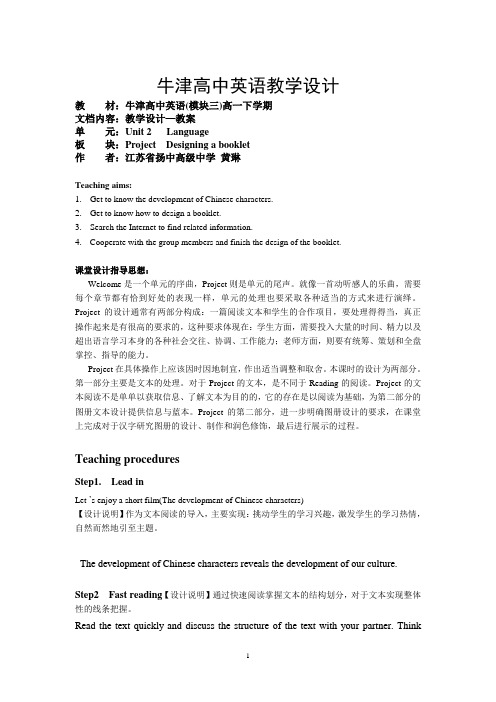
牛津高中英语教学设计教材:牛津高中英语(模块三)高一下学期文档内容:教学设计—教案单元:Unit 2 Language板块:Project Designing a booklet作者:江苏省扬中高级中学黄琳Teaching aims:1.Get to know the development of Chinese characters.2.Get to know how to design a booklet.3.Search the Internet to find related information.4.Cooperate with the group members and finish the design of the booklet.课堂设计指导思想:Welcome是一个单元的序曲,Project则是单元的尾声。
就像一首动听感人的乐曲,需要每个章节都有恰到好处的表现一样,单元的处理也要采取各种适当的方式来进行演绎。
Project的设计通常有两部分构成:一篇阅读文本和学生的合作项目,要处理得得当,真正操作起来是有很高的要求的,这种要求体现在:学生方面,需要投入大量的时间、精力以及超出语言学习本身的各种社会交往、协调、工作能力;老师方面,则要有统筹、策划和全盘掌控、指导的能力。
Project在具体操作上应该因时因地制宜,作出适当调整和取舍。
本课时的设计为两部分。
第一部分主要是文本的处理。
对于Project的文本,是不同于Reading的阅读。
Project的文本阅读不是单单以获取信息、了解文本为目的的,它的存在是以阅读为基础,为第二部分的图册文本设计提供信息与蓝本。
Project的第二部分,进一步明确图册设计的要求,在课堂上完成对于汉字研究图册的设计、制作和润色修饰,最后进行展示的过程。
Teaching proceduresStep1. Lead inLet ’s enjoy a short film(The development of Chinese characters)【设计说明】作为文本阅读的导入,主要实现:挑动学生的学习兴趣,激发学生的学习热情,自然而然地引至主题。
3AM3U2教案

3AM3U2教案教案编写目的:1.帮助学生掌握和运用关于城市和乡村方面的词汇和表达。
2.培养学生比较不同地域和生活方式的能力。
3.提高学生的听力、口语和写作技能。
教学目标:知识目标:1.学生能够掌握关于城市和乡村方面的词汇和表达。
2.学生能够比较城市和乡村的特点,并能就自己喜欢的地方进行描述。
能力目标:1.学生能听懂和理解与城市和乡村相关的对话和文章。
2.学生能用正确的语音语调朗读和表达关于城市和乡村的句子。
3.学生能参与到关于城市和乡村的口语交流中。
4.学生能用所学的词汇和句子写一篇关于城市或乡村的短文。
情感目标:1.培养学生对城市和乡村多元化的认识和理解。
2.培养学生对社区、环境保护和建设等问题的关注意识。
教学重点:1.掌握并运用关于城市和乡村方面的词汇和表达。
2.培养学生比较不同地域和生活方式的能力。
教学难点:1.学生能用正确的语音语调朗读和表达关于城市和乡村的句子。
2.学生能参与到关于城市和乡村的口语交流中。
教学准备:1.录音机/多媒体设备2.课件和PPT3.图片和图片说明4.学生教材和学习笔记教学过程:Step 1: 导入(15分钟)1.与学生讨论一下他们对城市和乡村的印象。
鼓励学生使用所学的词汇和表达进行描述。
2.出示一些与城市和乡村有关的图片,要求学生根据图片进行口头描述。
Step 2:听力理解(20分钟)1.教师播放一个关于城市和乡村的对话或短文,学生聆听并回答问题。
如:“在你家乡,你家附近有哪些自然环境好的地方?”、“你喜欢住在城市还是乡村?为什么?”等。
2.教师播放关于城市和乡村的相关录音,并提问学生有关内容,以培养学生听力和注意力。
Step 3: 词汇和句型练习(20分钟)1.教师出示一些与城市和乡村相关的图片,让学生说出每张图片对应的词汇。
例如:“市中心”、“森林”、“农田”等。
2.教师出示一些与城市和乡村相关的句子,学生模仿老师的语音语调朗读,并进行大声朗读。
例如:“我认为乡村的风景比城市的美丽多了。
依托“三个助手”促进精准化的教与学——以小学英语牛津教材4BM3U2单元为例

依托“三个助手”促进精准化的教与学——以小学英语牛津
教材4BM3U2单元为例
陆清恬
【期刊名称】《现代教学》
【年(卷),期】2024()5
【摘要】在开展数字化、智能化教学的过程中,我校引入了“三个助手”平台,以提供课前、课中、课后全方位的支持和辅助,促使学生的学、教师的教实现个性化,更好落实以学定教、因材施教,赋能小学英语课堂的教与学,助推教育数字化转型发展,提升学生的学习质量和教师的教学效率。
本文以小学英语牛津教材4BM3U2单元为例,介绍“三个助手”的实践过程。
【总页数】2页(P24-25)
【作者】陆清恬
【作者单位】上海市浦东新区龚路中心小学
【正文语种】中文
【中图分类】G63
【相关文献】
1.整合课程内容促进教学最优化——以牛津上海版英语教材(OE)单元project为例
2.《牛津小学英语》与《PEP小学英语》教材的比较分析——以小学三年级(下)英语教材为例
3.混合式教学理念在小学英语作业中的运用——以牛津教材
3AM2U1“About Me”单元作业为例4.单元主题引领下的小学英语教材与绘本融合应用研究——以牛津版教材为例
因版权原因,仅展示原文概要,查看原文内容请购买。
- 1、下载文档前请自行甄别文档内容的完整性,平台不提供额外的编辑、内容补充、找答案等附加服务。
- 2、"仅部分预览"的文档,不可在线预览部分如存在完整性等问题,可反馈申请退款(可完整预览的文档不适用该条件!)。
- 3、如文档侵犯您的权益,请联系客服反馈,我们会尽快为您处理(人工客服工作时间:9:00-18:30)。
Task 6: Designing a booklet of Chinese characters 1. Planning: what character to choose
2. Preparing: search for information about the word 3. Producing: divide your tasks among members
嘴里念的说的开始流行中国话
多少年我们苦练英文发音和文法 这几年换他们卷着舌头学平上去入的变化 平平仄仄平平仄 好聪明的中国人 好优美的中国话
What about in Taiwan?
中国航天业处于 世界领先水平
More examples?
中國航天業處於 世界領先水平
Task 5: Discussion Since the 1950s, same or change? 1. Words with new meaning or new words:
2-4: Form and development of Chinese characters 5: Simplified Chinese characters
Task 3. Scanning Para1: General introduction to Chinese characters
What makes the Chinese language different from Western languages?
A booklet of
Chinese Characters
新海高级中学高一(13)班
2012.2.26
Characters have interesting natural attrHale Waihona Puke ction.——Hold得住
Homework
1. Polish your booklet after class and hand it in to your teacher. 2. Finish the exercises on P99 of the workbook.
山、水 、月 休 、囚
Developed for directions 上 、下、乒、乓 and numbers Combining meaning and 砖、传、转 ? pronunciation together
Para 2-4: Form and development of Chinese characters
囧,神马,卖萌,你懂的
2. Borrowed words:
沙发,巧克力,迷你裙,可口可乐,酷,坦克,
罗曼蒂克,吉普,酒吧,克隆,hold得住 (English) 卡拉ok,榻榻米 (Japanese)
3. Words going into other languages: kungfu, tofu, kowtow, geili, gelivable, ungelivable, gelivability (English)
origin
Development of Chinese characters
form
history
types
Task 2: Structure
1: 2: General introduction to Chinese characters Origin of Chinese characters
嘴说腿腿说嘴
—— S.H.E
The development of Chinese characters
漢字的發展
汉字的发展
Aims 1. Students will be able to learn more about the development of Chinese characters.
p.s. /wiki/Chinese_character _classification
王丽爱 e-mail: wangliai@
qq: 2211434143
中国话
扁担宽板凳长
扁担宽板凳长
扁担想绑在板凳上
扁担想绑在板凳上
伦敦的玛丽莲买了件旗袍送妈妈 莫斯科的夫斯基爱上牛肉面疙瘩 各种颜色的皮肤各种颜色的头发
It uses characters which stand for ideas, objects or deeds.
Para 2:
Origin of Chinese characters
1.Who is thought to have invented Chinese writing?
Cang Jie ? Father of Chinese characters
Module 3 Unit 2 Project Designing a booklet
Step 1. Lead-in
中国话
嘴说腿爱跑腿 腿说嘴爱卖嘴 光动嘴不动腿
有个小孩叫小杜 上街打醋又买布 打了醋买了布
回头看见鹰抓兔
放下布搁下醋 上前去追鹰和兔 飞了鹰跑了兔 洒了醋湿了布
光动腿不动嘴
不如不长腿和嘴 到底是那嘴说腿 还是腿说嘴
2. Students will be able to read and use the background information to complete their booklet.
Brainstorm: ?
Development of Chinese characters
?
?
?
Task 1: Skimming
Types of characters
Type 1 象形字 Type 2 会意字 Type 3 指事字
Description drawings of physical objects combining two or more characters together developed for directions and numbers combining meaning and pronunciation together
木
Method: Internet Findings: It is a drawing of a tree. It shows a trunk and two branches. The bottom part of it is the root. Together with 乔, it makes 桥(bridge). Conclusion: Chinese characters were invented according to the shapes of physical objects.
Para 2-4: Form and development of Chinese characters
Types of characters Type 1 象形字 ________ Type 2 会意字 ________ Type 3 指事字 ________ Type 4 形声字 ________ Description drawings of physical objects Combining two or more characters together Examples
Trend of developing
develop from drawings into standard forms _____________
Type 4 形声字
Para 5: Simplified Chinese characters What happened to Chinese characters in the 1950s? The Chinese government introduced simplified Chinese characters. Task 4: What can we infer from this paragraph? Before the 1950s, Chinese characters were complicated and difficult to write.
2. What gave him the idea to invent characters?
He saw the tracks of animals in the snow and observed that the appearance of each one was different.
Smart, creative, careful ?
Character: 木,人,仙,乒乓,杳,尖,种
Method: internet, books, survey Findings: form, meaning Conclusion: Chinese characters were invented…
4. Presenting:
Character:
